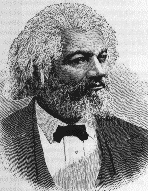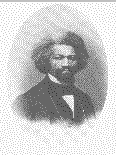 Born into slavery,
Frederick Douglass lived to become
one of the most influential figures in African American history. As a young
man and a slave in Maryland, Frederick Douglass was recognized as a bright
young man by both blacks and whites. During his life as a slave in Baltimore
he learned to read and write and passed his knowledge along to other blacks
in Baltimore. Douglass is remembered as a great speaker. His speaking abilities
were developed in the secret debating club called the East Baltimore Mental
Improvement Society.
Born into slavery,
Frederick Douglass lived to become
one of the most influential figures in African American history. As a young
man and a slave in Maryland, Frederick Douglass was recognized as a bright
young man by both blacks and whites. During his life as a slave in Baltimore
he learned to read and write and passed his knowledge along to other blacks
in Baltimore. Douglass is remembered as a great speaker. His speaking abilities
were developed in the secret debating club called the East Baltimore Mental
Improvement Society. He escaped from slavery to New Bedford, Massachusetts in 1838. There he discovered the newspaper of the leading white abolitionist William Lloyd Garrison, The Liberator. Douglass and Garrison soon impressed one another and would work together for social reform and the abolition of slavery. Because of his speaking ability, Douglass soon became the major drawing card at meetings of the abolitionist society. A deep melodious voice, grace and a flair for the dramatic would allow Douglass to mesmerize his listeners at the abolitionist meetings.  From 1845 to 1847, Douglas would travel in Great Britain
speaking for the elimination of slavery. While in Britain he expanded his
view of the struggle for human rights. He spoke in favor of Irish home
rule and eventually would speak on behalf of the landless European peasantry,
women's suffrage, prison reform, free public school education and universal
peace. In 1846 he wrote to Garrison, "I cannot allow myself to be
insensitive to the wrongs and sufferings of any part of the great family
of man[sic]."
From 1845 to 1847, Douglas would travel in Great Britain
speaking for the elimination of slavery. While in Britain he expanded his
view of the struggle for human rights. He spoke in favor of Irish home
rule and eventually would speak on behalf of the landless European peasantry,
women's suffrage, prison reform, free public school education and universal
peace. In 1846 he wrote to Garrison, "I cannot allow myself to be
insensitive to the wrongs and sufferings of any part of the great family
of man[sic]." Douglass would eventually split with Garrison and the largely white abolitionist movement to work more closely with the Black leaders of the time. Many of the leading black figures of the time were critical of Douglass. They did not believe that justice could ever be achieved for Blacks in this country while Douglass maintained an optimistic vision for America. During the Civil War Frederick Douglass worked as an enlistment officer and encouraged President Lincoln to make Emancipation an issue in the Civil War. Following the war Douglass would work for the Freedman's Bureau, the Freedman Bank and hold various government appointments including minister to Haiti and US marshal for the District of Columbia. Douglass writes, "The real question, the all commanding question, is whether American justice, American liberty, American civilization, American law and American Christianity can be made to include and protect alike and forever all American citizens. . ." |